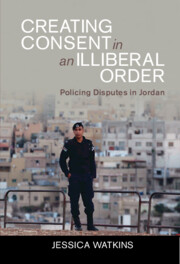Book contents
- Creating Consent in an Illiberal Order
- Cambridge Middle East Studies
- Creating Consent in an Illiberal Order
- Copyright page
- Contents
- Figures
- Maps
- Tables
- Preface
- Acknowledgements
- Note on Transliterations
- Abbreviations
- 1 Introduction
- 2 Strategic Alliances and Amalgamated Social Orders
- 3 State Policing, from the Ottoman Gendarmerie to the Public Security Directorate
- 4 Criminalising Disputes and Disputing Criminality
- 5 Policing Blood Crimes in the (Neo)Tribal Tradition
- 6 Policing Domestic Abuse
- 7 Community Policing After the Uprisings
- 8 From Neoliberal Securitised Policing Back to the Disputing Process
- Bibliography
- Index
- Books in the Series
4 - Criminalising Disputes and Disputing Criminality
Legal Pluralism in Police Practice
Published online by Cambridge University Press: 02 June 2022
- Creating Consent in an Illiberal Order
- Cambridge Middle East Studies
- Creating Consent in an Illiberal Order
- Copyright page
- Contents
- Figures
- Maps
- Tables
- Preface
- Acknowledgements
- Note on Transliterations
- Abbreviations
- 1 Introduction
- 2 Strategic Alliances and Amalgamated Social Orders
- 3 State Policing, from the Ottoman Gendarmerie to the Public Security Directorate
- 4 Criminalising Disputes and Disputing Criminality
- 5 Policing Blood Crimes in the (Neo)Tribal Tradition
- 6 Policing Domestic Abuse
- 7 Community Policing After the Uprisings
- 8 From Neoliberal Securitised Policing Back to the Disputing Process
- Bibliography
- Index
- Books in the Series
Summary
Police practices substantiate legal abstractions, but frequently the police are influenced by normative frameworks beyond the framework of the civil laws that regulate their work.This chapter examines the interrelationship between Jordan’s tradition of legal pluralism and the hegemonic values that influence different kinds of social order. It also considers how the civil legal system takes account of tribal settlements with respect to the ‘personal right’ accorded to victims, and reviews how the blend of customary, formalised tribal, Islamic and civil legal traditions that co-exist in Jordan shape the field of practice within which the police manage grievances. Frequently exercising discretion, the police treat some of these grievances as crimes, and others as disputes between citizens, reflecting the common reticence of citizens to prosecute cases in the civil courts.
Keywords
- Type
- Chapter
- Information
- Creating Consent in an Illiberal OrderPolicing Disputes in Jordan, pp. 92 - 117Publisher: Cambridge University PressPrint publication year: 2022

